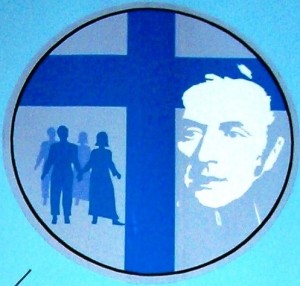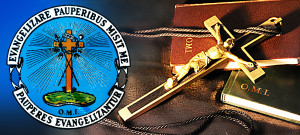The call:
We are people “set apart for the Gospel” (Rom 1: 1), ready to leave everything to be disciples of Jesus.
The response: come and see and be transformed
The desire to co-operate with him draws us to know him more deeply, to identify with him, to let him live in us.
The missionary response: oblation
We strive to reproduce in ourselves the pattern of his life. Thus, we give ourselves to the Father in obedience even unto death and dedicate ourselves to God’s people in unselfish love.
Our apostolic zeal is sustained by the unreserved gift we make of ourselves in our oblation, an offering constantly renewed by the challenges of our mission
CC&RR, Constitution 2
Every person who responds to the call of the Savior, following the example and spirituality of Eugene de Mazenod, is “set apart for the Gospel” (Rom 1: 1), (and) ready to leave everything to be disciple of Jesus”.
I am constantly struck by the words, “the unreserved gift we make of ourselves in our oblation.” Firstly, I think of so many great Oblates who have given everything to evangelize the most abandoned – many becoming martyrs. “Thus, we give ourselves to the Father in obedience even unto death.”
 But then my focus moves wider, to countless people who have been equally generous in their life of service. “Oblation” may sound strange to their ears when they hear it applied to them, but dedicated service in the Mazenodian Family is nothing less than this. All our Oblate missions, all our community houses, all our works are filled with people whose service to the mission is nothing less than an oblation.
But then my focus moves wider, to countless people who have been equally generous in their life of service. “Oblation” may sound strange to their ears when they hear it applied to them, but dedicated service in the Mazenodian Family is nothing less than this. All our Oblate missions, all our community houses, all our works are filled with people whose service to the mission is nothing less than an oblation.
Then there are our associates and partners who are not directly involved in mission as such, but permeated with the spirituality and values of St Eugene, live everyday lives of oblation at the service of those in need around them – starting perhaps with heroic courage in serving someone in their own home who is in need.
In my own personal experience, I have met hundreds of examples of lay oblation. As I write this, I pause to recall their faces and names and give thanks… What a gift to have had such extraordinary teachers of the meaning of oblation! What a privilege to continue to be taught today by laity who live oblation behind pots and pans, using brooms to clean the church, receptionists welcoming people , teaching catechism, looking after the sick and marginalized… “the unreserved gift we make of ourselves in our oblation.” This is the living face of the Mazenodian Family!
“You give but little when you give of your possessions. It is when you give of yourself that you truly give.” Khalil Gibran


We are the results of the years of oblation by the Oblates, and many, many others. I think back for a moment of the person whose mission opened the door for me to be able to hear God’s voice. He was a young Franciscan priest and my heart will forever hold great love and tenderness for the Franciscans. “We must lead them to become human, then Christian and help them to become saints.” Franciscans, people of Madonna House and then Oblates of Mary Immaculate. No borders, not just one way.
The desire to co-operate with him draws us to know him more deeply, to identify with him, to let him live in us. This started slowly and I was mostly unaware of it, but it happened over the years. It happened with the Oblates, it happened with the Holy Spirit, always there guiding, forming, loving. I think of the years when I would secretly give myself over to God, not knowing the ‘right words’ but driven by something much greater than myself. I was becoming transformed – I was becoming! The first call from God of course and then the invitation and way to live it all out – from Saint Eugene de Mazenod. A way of living and being and becoming fully alive. Yesterday I read the piece on “Daring” from the Dictionary of Oblate Values and then reflected on what that might look like in my own life, in the breathing in and breathing out of my life.
Yesterday I got hearing aids. I have not been deaf but have suffered from hearing loss for probably 2/3 of my life and it has diminished considerably over the past 5 years (the aging process). Yesterday I began to hear things that I have not heard for a very long time – many of the sounds that are a part of everyday life and which most tend to filter out. Much is new to me and today I will hear new things – I am looking forward to that. I am full of anticipation which is not unusual for me when I start a day, but it has been heightened with the gift of better hearing that I received yesterday.
Today I will carry “the unreserved gift we make of ourselves in our oblation” as I move through my day. What does it look like? Do I give myself totally, unreservedly?
Carissimo p. Frank, leggendo e meditando sulle tue considerazioni riportate in “Eugene de Mazenod speaks to us” del 7 aprile ’16, OUR FOUNDING VISION TODAY: THE OBLATION OF OUR LAY PEOPLE, mi colpiva in particolare il passaggio:”…laici che vivono l’oblazione dietro pentole e padelle, utilizzando scope per pulire la chiesa, come addetti alla reception che accolgono le persone, insegnando il catechismo, prendendosi cura di malati ed emarginati …”
Ecco le mie riflessioni al riguardo.
L’oblazione nel disbrigo delle faccende e nel lavoro nasce dalla grazia battesimale e in risposta alla “particolare vocazione di «cercare il Regno di Dio trattando le cose temporali e ordinandole secondo Dio»” (ChL 15).
Il prendersi cura di malati ed emarginati fa parte di quelle opere di misericordia a cui tutti siamo chiamati per “guadagnarci il paradiso” e non sono che delle declinazioni dell’amore al prossimo, nel quale riconosciamo la presenza di nostro Signore.
Domanda 1. Perché questi laici si sentono parte della Famiglia Demazenodiana e con un legame forte con gli OMI?
Il sentirsi parte integrante di una famiglia “carismatica” di per sé non è indice di condivisione del carisma. Il battesimo, innestandoci nel mistero pasquale, ci porta ad un vero legame di sangue; per la grazia battesimale, tutti noi “siamo” chiesa. Ciò che ci unisce con il battesimo è molto più di ciò che ci distingue come sacerdoti, religiosi, laici, sposati.
Domanda 2. Perché questi laici condividono un cammino di fede basato sulla spiritualità demazenodiana con gli OMI e non con altre realtà ecclesiali?
Qui entra in gioco la storia di ciascuno. Chi vive in una parrocchia “oblata”; chi ha scoperto o riscoperto la fede in seguito ad una missione popolare degli OMI; chi è stato invitato da amici ad incontri con gli OMI, può trovare naturale intraprendere un cammino con loro, anche perché la spiritualità demazenodiana ovviamente è radicata nel vangelo.
Domanda 3. Perché alcuni, dopo aver frequentato gli OMI, continuano il loro cammino in altre realtà mentre altri proseguono con loro?
Il fatto di trovarsi a proprio agio, in sintonia, con lo stile “oblato” non implica automaticamente una condivisione del carisma.
Domanda 4. Alcuni di questi laici si associano e sottoscrivono pubblicamente di cooperare con gli OMI per promuovere i valori della spiritualità demazenodiana; non condividono così anche il carisma?
La spiritualità oblata, come detto, è una spiritualità evangelica e promuove, quindi, valori evangelici che, per la grazia battesimale, siamo tutti chiamati a condividere e a promuovere.
Domanda 5. Quando possiamo affermare che un laico condivide il carisma demazenodiano?
A mio avviso, la peculiarità del carisma è: mettersi insieme per spezzare il pane della Parola ai poveri dei molteplici volti, con predilezione di coloro che le altre realtà ecclesiali raggiungono meno. Anche per questa realtà si potrebbe evidenziare che è compito di tutti i laici annunciare la Parola: “Tuttavia tale apostolato non consiste soltanto nella testimonianza della vita; il vero apostolo cerca le occasioni per annunziare Cristo con la parola sia ai non credenti per condurli alla fede, sia ai fedeli per istruirli, confermarli ed indurli ad una vita più fervente; « poiché l’amore di Cristo ci sospinge » (2 Cor 5,14) e nel cuore di tutti devono echeggiare le parole dell’Apostolo: «Guai a me se non annunciassi il Vangelo » (1 Cor 9,16) se non annunciassi il Vangelo » (1 Cor 9,16) (11).” (AA6; cfr ChL33).
A mio avviso, ciò che contraddistingue il laico oblato di Maria Immacolata, è la spinta interiore, il “tarlo”, a cooperare, a mettersi insieme come S. Eugenio ha cercato Tempier e compagni, al fine di spezzare la parola, cioè di comunicare Cristo Salvatore e la Buona Notizia, nel modo più comprensibile possibile, escogitando anche strade nuove come predicare in dialetto provenzale. Il laico OMI sente l’esigenza di fare ciò anche a prescindere dalla presenza degli OMI religiosi. Non gli basta l’apostolato individuale. Non gli basta cooperare con gli OMI, sente di dover egli stesso cercare e suggerire strade nuove. In altri termini, “possiede” il carisma, non ne è solo destinatario, ma anche fonte.
Conclusioni
Se questa prospettiva è corretta, forse si ridimensionerà il numero di laici oblati di M.I.. Non si ridimensionerà, invece, a mio avviso, il numero dei componenti della Famiglia Demazenodiana. Nell’ottica dell’ecclesiologia di comunione, radicata nella grazia battesimale, i cui concetti chiave sono corresponsabilità e complementarità delle vocazioni, tutti siamo chiamati ad evangelizzare i poveri, ciascuno secondo la propria vocazione e i propri talenti. La Famiglia Demazenodiana è una porzione di chiesa, in cui tutti i battezzati hanno diritto di cittadinanza. All’interno della Famiglia coloro che sono animati dalla grazia del carisma non sono componenti di serie A rispetto a coloro che sono animati dalla “sola” grazia battesimale: ciò che ci unisce è molto di più di ciò che ci distingue.
In pratica, forse queste riflessioni potranno evitare equivoci e frizioni e, in positivo, aiuteranno a vivere con gioia il nostro essere chiesa nella Famiglia di Sant’Eugenio de Mazenod.
Pingback: THE FOUNDING VISION TODAY: TO BE CHURCH IN THE MAZENODIAN FAMILY. | Eugene de Mazenod speaks to us